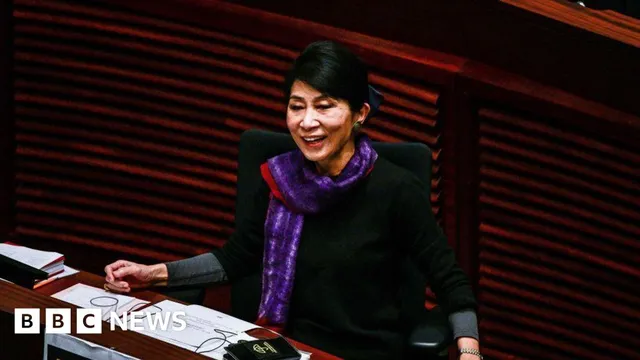
Four Hong Kong lawmakers freed after years in prison under controversial law
2025-04-29 03:57- Claudia Mo, Jeremy Tam, Kwok Ka-ki, and Gary Fan were released after over four years in prison.
- They were convicted under a controversial Beijing-imposed law following their roles in an unofficial primary election.
- Their release highlights ongoing tensions surrounding civil liberties and protest suppression in Hong Kong.
Express your sentiment!
Insights
In Hong Kong, four former lawmakers were freed from prison on Tuesday after serving over four years for their involvement in an unofficial primary election in 2020. These lawmakers, Claudia Mo, Jeremy Tam, Kwok Ka-ki, and Gary Fan, were part of a larger group of 47 activists arrested in 2021 under a Beijing-imposed national security law targeting pro-democracy efforts. Their arrests followed widespread anti-government protests in 2019 that called for greater democratic freedoms and accountability from the Hong Kong government. The 2020 primary election, although unofficial, attracted 610,000 voters and was seen as a way for pro-democracy candidates to challenge the establishment. However, the Hong Kong government postponed official legislative elections, citing health risks from the COVID-19 pandemic. Prosecutors claimed the activists intended to paralyze the government and force the resignation of the city's leader by winning a legislative majority. In their verdict, judges stated that the defendants’ plans could have undermined government authority and resulted in a constitutional crisis. Following their convictions, which varied in length from four years and two months to ten years, some of the convicted activists, including legal scholar Benny Tai and former student leader Joshua Wong, were sentenced to significant prison terms. Despite the harsh sentences, it is noteworthy that only two out of the original 47 defendants were acquitted. The release of Mo, Tam, Kwok, and Fan marked a bittersweet reunion with their families after prolonged separation. Critics argue these convictions reflect the governmental strategy to stifle dissent and have highlighted the ongoing erosion of civil liberties promised by Beijing when Hong Kong was handed back to China in 1997. The national security law, according to authorities, is portrayed as necessary for maintaining stability in the region, yet many view it as a tool to quash democratic movements and intimidate opposition. This tense political climate continues to raise concerns both locally and internationally regarding Hong Kong’s future governance and the genuine state of civil liberties in the region.
Contexts
The impact of Beijing-imposed laws on the Hong Kong pro-democracy movement has been profound and far-reaching, significantly altering the political landscape of the region. In the wake of the enactment of the National Security Law in July 2020, the Hong Kong government has intensified its crackdown on dissent, erasing much of the autonomy that made the region a unique bastion of freedoms and democratic practices within China. This law has criminalized acts of secession, subversion, terrorism, and collusion with foreign forces, creating an environment of fear among activists, journalists, and ordinary citizens alike. The chilling effect of these laws has prompted many pro-democracy advocates to flee Hong Kong, while those who remain face heightened risks of arrest and persecution, undermining the foundational principles of free speech and assembly that the movement has sought to protect and cultivate. Moreover, legal proceedings against prominent figures of the pro-democracy movement, including former lawmakers and activists, have been expedited, often circumventing fair trial standards and international norms. This strategic use of the law indicates Beijing's commitment to extinguishing any semblance of opposition within the territory, fundamentally altering the trajectory of the pro-democracy aspirations of Hong Kong citizens. The response of the international community to Beijing's encroachment upon Hong Kong's freedoms has also been significant but varied. Some Western nations have condemned the National Security Law and taken steps to impose sanctions against Chinese and Hong Kong officials responsible for the repression of civil liberties. Several countries have extended residency offers to Hong Kong residents seeking to escape the oppressive environment and have increased diplomatic efforts in support of pro-democracy causes. However, despite these efforts, the effectiveness of international interventions remains questionable. The Chinese government has maintained a hardline stance, dismissing external criticism as interference in its internal affairs, while strengthening its grip on Hong Kong through increased surveillance and stringent regulations on civil society organizations. This dynamic presents a complex challenge for pro-democracy proponents who rely on external support yet find their movements increasingly stifled by local and international developments. Within Hong Kong, the pro-democracy movement has been forced to adapt to the harsh realities brought about by the Beijing-imposed laws, which has led to a transformation in tactics and strategies. Grassroots organizations have shifted focus towards community building, education, and resistance in subtle forms. Digital activism and the use of encrypted communication platforms have gained prominence as activists seek to mobilize public sentiment while minimizing risks associated with physical gatherings, which have been deemed illegal under the new legal framework. Nevertheless, the erosion of press freedoms and the harassment of independent media outlets have made it challenging to disseminate information effectively and maintain public engagement. In this context, the pro-democracy movement faces a dual battle: the fight against pervasive state suppression and the necessity to foster resilience and continuity in their cause amidst the climate of fear. In conclusion, the Beijing-imposed laws have dramatically impacted the Hong Kong pro-democracy movement by curtailing civil liberties, reshaping strategies of resistance, and eliciting varied responses from the international community. The future of the pro-democracy movement remains uncertain as activists navigate a precarious landscape marked by the threat of legal repercussions and the need for adaptation to survive under an increasingly authoritarian regime. However, the spirit of resistance among individuals and communities committed to democratic values continues to inspire hope for potential avenues for change, even in the face of repression.